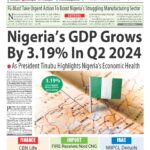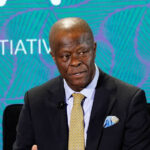Nigeria has made a notable advancement in its export sector, generating 3.834 million metric tonnes of non-oil products, which has brought in over $2.7 billion in revenue during the first half of 2024.
This represents a significant increase of 6.26 percent from the $2.539 billion earned in the same period last year.

Mrs. Nonye Ayeni, Executive Director of the Nigerian Export Promotion Council (NEPC), announced these figures in Abuja during the recent presentation of the Progress Report on non-oil exports.
She attributed this rise in export value to the council’s ‘Operation Double Your Exports’ initiative and various export intervention programs.
According to Mrs. Ayeni, Nigeria exported a total of 211 products in the first half of 2024, which included a range of agricultural commodities and products from the extractive industries. Notably, cocoa beans led as the most exported commodity, followed by fertilizers.
This shift indicates a growing diversification of Nigerian exports from traditional raw agricultural products to more semi-processed and manufactured goods.
The report also highlighted that 873 companies were involved in exporting Nigerian products, showing an increasing trend among businesses to embrace the council’s diversification campaign from oil to non-oil exports. Non-oil products were shipped to 122 countries across Africa, the Americas, Asia, Europe, and Oceania. Noteworthy importers include the Netherlands, Malaysia, and Brazil, with Ghana being the only African country in the top 15 global importers, ranked 14th.
To address the challenge of product rejections, Mrs. Ayeni mentioned that the NEPC is working with relevant agencies to enhance awareness, improve agricultural practices, and ensure better labelling and packaging standards. These efforts are aimed at meeting international quality standards and reducing the rate of product rejections in the global market.
The NEPC remains committed to contributing significantly to Nigeria’s Gross Domestic Product (GDP), increasing foreign exchange earnings, and supporting sustainable economic growth. This aligns with the ‘Renewed Hope Agenda’ of President Bola Tinubu, which focuses on job creation and poverty alleviation.





